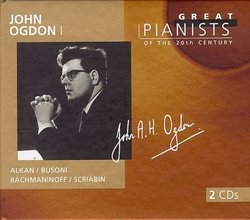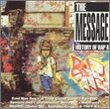| All Artists: John Ogdon, Rachmaninoff, Busoni Title: Great Pianists 72 Members Wishing: 1 Total Copies: 0 Label: Philips Release Date: 2/9/1999 Genre: Classical Styles: Chamber Music, Forms & Genres, Concertos, Sonatas, Historical Periods, Classical (c.1770-1830), Modern, 20th, & 21st Century, Instruments, Keyboard Number of Discs: 2 SwapaCD Credits: 2 UPC: 028945691329 |
Search - John Ogdon, Rachmaninoff, Busoni :: Great Pianists 72
 | John Ogdon, Rachmaninoff, Busoni Great Pianists 72 Genre: Classical
|
Larger Image |
CD DetailsSimilar CDs
|
CD ReviewsA "Must Have" for the keyboard lover. Shattering brilliance. 04/18/1999 (5 out of 5 stars) "John Ogdon was one of the centuries most interesting pianists. An artist of spectacular technical capacity, he was also one of the great musical explorers. His performance of Charles-Valentin Alkan's astounding Concerto for Solo Piano would make these CDs worth having all by itself. That this compilation also includes his performance of Busoni's Concerto for Piano & orchestra makes for an embaressment of riches. On 2 CDs one has a compendium of all of the best of Ogden's art. Do not pass this one by." BURN-OUT DAVID BRYSON | Glossop Derbyshire England | 03/15/2004 (4 out of 5 stars) "The tragic story of this prodigiously gifted and very unworldly musician is moderately well known. He simply could not say no. He would carry on giving encores for hours on end. He would pursue any musical lost cause and learn and perform the most unbeguiling modern works, while still pounding out renditions of the Tchaikovsky, Liszt and Grieg warhorses `because one enjoys playing them so much', as I heard him say in a broadcast interview. I think he played more works in a single season than Michelangeli and Serkin played in their entire lives. He was a prolific composer into the bargain, but the most pitiful aspect of the whole saga is the wince-making story of the punishing concert schedule he took on to pay for better suites of furniture and other manifestations of his wife's seeming desire to be some kind of Hyacinth Bucket. It was all bound to end in tears, and it ended in worse than that. He suffered a breakdown in 1973 while still in his 30's but continued pushing himself beyond endurance. The reliability of his playing became, not unnaturally, a little unpredictable, but if one thing is for certain it is that he got through a lot of output. I am reminded of a phrase in the old Latin liturgy about one of the Jesuit saints `consummatus in brevi explevit tempora multa' - burned up in a brief space he achieved many lifetimes. Trying belatedly to know his work better, I find one thought growing on me. Of pianists born in the 20th century there are six, I do not say which, who stand out for me by virtue of an extraordinary and pre-eminent individuality. There is no seventh, but if there were a seventh for me it might well be Ogdon. I am only half in agreement with the view that he did not live to establish a fully distinctive manner. Horowitz and Michelangeli both, Horowitz showing at least basic courtesy Michelangeli a great deal less, disparaged a new generation of near-indistinguishable assembly-line virtuosi. What I do feel is that this set does not quite show why I might exempt Ogdon from this category. The technical dispatch is colossal. Ogdon placed his massive frame on the piano stool and any movement was from the elbows downwards, recalling to me some accounts of Handel's playing. I am not bothered in the slightest by a misplayed chord in the Alkan - good heavens try assessing Horowitz or Richter on that basis. The Rachmaninov sonata has to face comparison with Horowitz and it comes badly out of it. It is full of fire, drama and virtuosity, but there is far too much pedal and one appreciates just how savvy Horowitz was. He gets into his stride with the short Scriabin sonata and stays in it from there on. In the Alkan the obvious comparison is with Ronald Smith, but as Professor Smith uses an instrument contemporary with the composer the comparison is tricky and probably a bit pointless. What does start to identify something really unique in Ogdon here is the sense of continuity and unremitting concentration in the first movement, nearly half an hour of it. The BBC have a performance from him of Schubert's C minor sonata that is the greatest I have ever heard, better than Lupu and far better than Zacharias, and if you ever hear that amazing account of the last movement, seemingly played as one huge phrase, you may see and hear what I mean. I find something of the same here in the Alkan. The biggest thing on this set is obviously Busoni's tyrannosaurus of a concerto. For me this is what Horowitz called `kleine Grosskunst', full of wind, sound and fury signifying not much. If I could even recall the other performances that I have heard of it I should not be surprised to find Ogdon's the best, and I am certainly not in search of better. The general pattern is as before - terrific virtuosity, but in a piece where the actual music does nothing for me the playing does not quite do the trick for me either as, say, Michelangeli's does for me in Liszt's almost equally unalluring Totentanz. In Ogdon's memory I hope the BBC may sometime release a performance of Liszt's E flat concerto from him, in which he seemed to me to rival Cziffra and maybe even Michelangeli himself. I have had enough glimpses of what he really amounts to for me to want to get to know more. Rest well now, big guy, if anyone ever tried his outright hardest you did. The world is a better place for what you put into it." The Good and the Bad of Ogdon's Playing Kris Rucinski | Interlochen, MI (USA) | 10/23/2000 (3 out of 5 stars) "It is fairly well accepted that pianist John Ogdon is one of the greatest musical talents and potentials of this century. This particular compilation, however, does not do very much justice to his skills. First in line, his recording of the Alkan concerto is very fuzzy and spontaneous in sections. The sound quality is no better than decent, and Ogdon is definitely not at the height of his technique here. From the harsh opening statement of the first movement to the missed chord in the opening of the last movement, one gets the impression that Ogdon did not put as much time or thought into the process that all pianists must, the process of realizing the shape of the work and how to make that shape interesting, but not radical. Probbably included on this disc for reasons regarding Alkan's often overlooked importance, this recording is not a very specail one, lacking the sound structural clarity of Gibbons or the bombastic virtuosity of Hamelin. After this long session of confused musical intention, we move to a very redeeming recording of Scriabin's popular 4th sonata in F# Major. The first movement is beautifully played; Ogdon's tone is very airy and delicate. Once we move to the "very fast and flying" second movement, Ogdon's rythmic playing and aviodance of strong accents move the piece along very smoothly. The coda remains very exciting, even after repeated listenings, though his treatment of the final two measures are somewhat out of the brilliant context of the massive sound he achieves earlier. Ogdon's Busoni concerto is very sound, and the finale is beautifully complimented with a much more prominent male chorus than in most performances (as Busoni specifically noted that the chorus was to be literally hidden from view and only suggestive in importance to the solo opportunities of the orchestra). This is defenitily the steak of this set, and it is niether underprepared nor overdone. The true music enthusiast, however, should dwell on more important recordings by Ogdon, such as his performance of Sorabji's titanic Opus Clavicembalisticum. Ogdon's love of the neglected and obscure is much easier to picture after listening to this set, but his amazing virtuosity and technical prowess is not done justice here, especially in the Alkan."
|

 Track Listings (8) - Disc #1
Track Listings (8) - Disc #1



